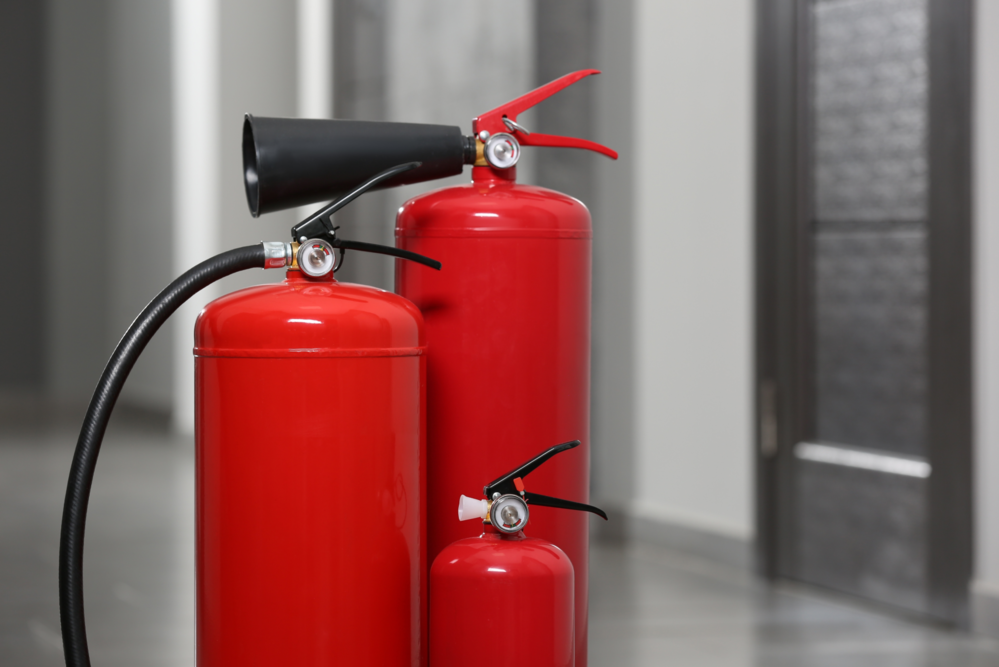Types of fire extinguishers:
Which is best for your business

Fire safety is paramount in any business environment, but the type of fire extinguisher required can vary significantly depending on the specific risks associated with different industries. Selecting the right extinguisher ensures not only compliance with safety regulations but also the protection of lives and property. Here’s a guide to the best fire extinguishers for commercial businesses, manufacturing operations, and heavy industrial operations.
Commercial Businesses:
Commercial businesses, such as offices, retail stores, and restaurants, typically face Class A (ordinary combustibles like wood and paper), Class B (flammable liquids), and Class C (electrical) fire risks. The best choice for these environments is the ABC Dry Chemical Fire Extinguisher. This versatile extinguisher is effective on all three types of fires, making it ideal for general commercial use. The dry chemical agent quickly smothers flames by interrupting the chemical reaction of the fire triangle (heat, fuel, and oxygen).
For environments where electrical equipment is prevalent, such as server rooms or areas with a high density of electronics, a CO2, or Clean Gas Fire Extinguishers are recommended. These extinguishers are effective on Class B and C fires, and they leave no residue, which is crucial for preventing damage to sensitive equipment.
Manufacturing Operations:
Manufacturing facilities present a diverse array of fire hazards, from combustible materials to flammable liquids and electrical equipment. Given this complexity, a combination of extinguishers is often necessary:
- ABC Dry Chemical Fire Extinguisher: Its versatility makes it suitable for general areas within the manufacturing facility.
- Class D Fire Extinguisher: For operations involving combustible metals (e.g., magnesium, titanium, sodium), a Class D extinguisher is essential. These extinguishers use a dry powder agent that separates the fuel from oxygen or removes the heat element.
- CO2 Fire Extinguisher: For areas with significant electrical equipment, CO2 extinguishers provide effective fire suppression without leaving harmful residues.
Manufacturers should conduct thorough risk assessments to identify specific hazards and ensure the appropriate types of extinguishers are readily accessible.
Heavy Industrial Operations:
Heavy industrial operations, such as those in oil and gas, chemical manufacturing, and mining, face some of the most severe fire risks, including flammable gases, liquids, and reactive metals. The following extinguishers are recommended:
- Class K Fire Extinguisher: For industries dealing with high-temperature cooking oils and fats (e.g., food processing plants), a Class K extinguisher is crucial. It uses a wet chemical agent to create a soapy foam that cools and smothers fires, preventing re-ignition.
- Class D Fire Extinguisher: Essential for operations involving reactive metals. The specialized dry powder in Class D extinguishers is designed to safely and effectively manage these types of fires.
- Foam Fire Extinguisher: Suitable for Class A and B fires, foam extinguishers are effective in areas with flammable liquids. The foam forms a blanket over the burning substance, cutting off the oxygen supply and preventing re-ignition.
- CO2 Fire Extinguisher: As in other settings, CO2 extinguishers are vital for electrical fire risks, providing a non-conductive and residue-free solution.
Choosing the right fire extinguisher for different business environments is critical to ensuring effective fire safety. Commercial businesses benefit from versatile ABC and CO2 extinguishers, manufacturing operations require a mix of ABC, CO2, and Class D extinguishers, while heavy industrial operations demand the specialized capabilities of Class K, Class D, foam, and CO2 extinguishers.
Still not sure? We’re here to clear the smoke so you know clearly what to do. Contact us anytime!


